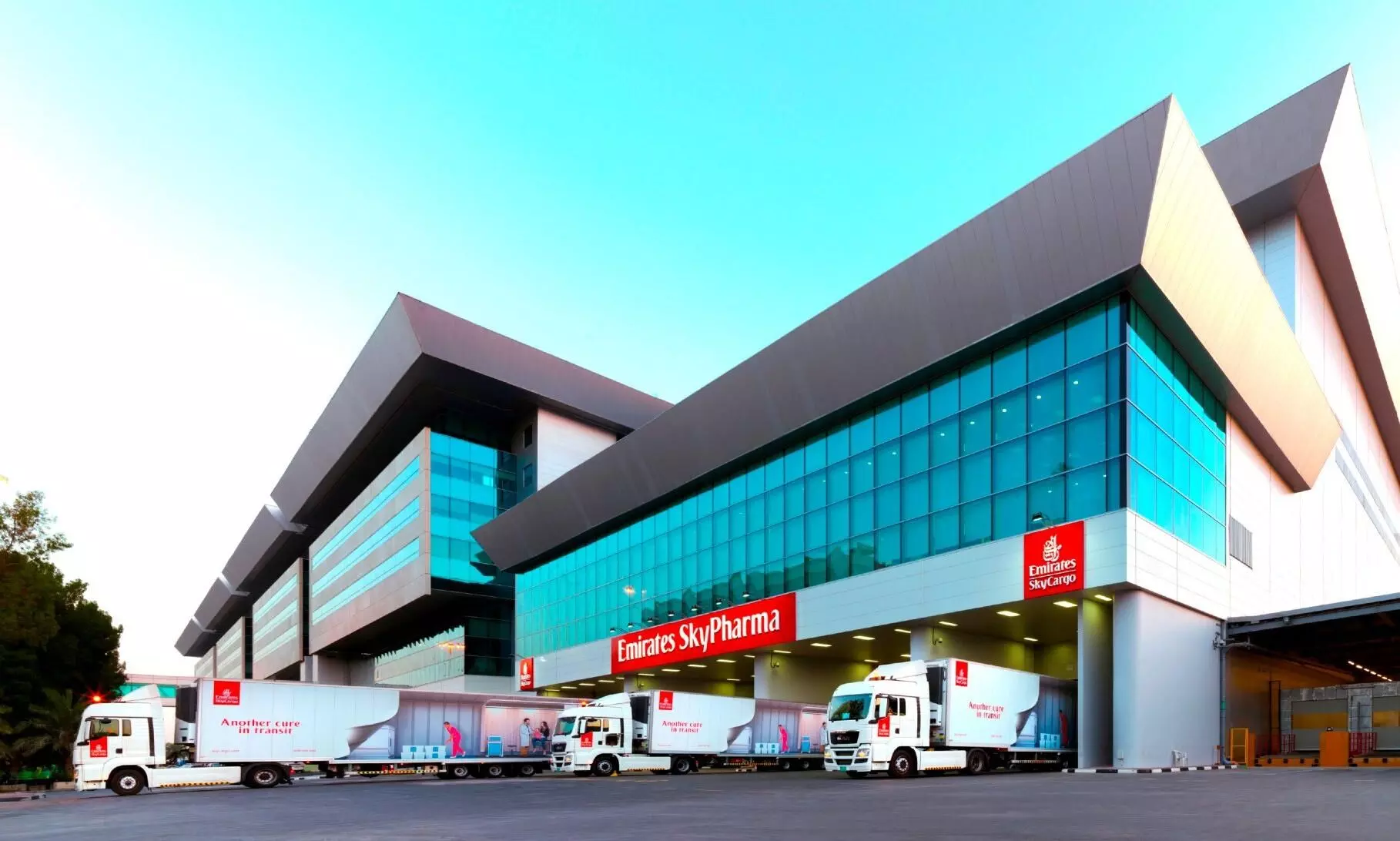
UAE: At the heart of global air cargo map

With some of the top-ranking airports & airlines, suitable geographic position, substantial investments and a supportive business environment, the United Arab Emirates can boast of being the heart of the global air cargo map.
In the month of May 2023, as the Northern Hemisphere was warming up and preparing for a busy summer season of weddings and outdoor events, the cargo handle of UAE-based airline Emirates reported a 20 percent rise in the demand for time- and temperature-sensitive fresh cut flowers compared to the same period last year.
Emirates SkyCargo transported 3,590 tonnes of them in May 2023.
The most important thing to be noticed here is that the top two export origin locations for the cargo airline were the South American country Ecuador and the African nation Kenya while the top import locations include the Netherlands, the UAE, Australia and Saudi Arabia.
This is a prime example of how the UAE plays a crucial role as the global hub for air cargo and stays at the heart of the world’s air cargo market with some of the best airport infrastructure and cargo capacity spread across the globe from its hub in Dubai.
The release also reads, “Perishables are the carrier’s largest business by tonnage carried, uplifting an average of 22,500 tonnes of perishable commodities every month. Ranging from freshly picked mangoes from Pakistan, to salmon from Norway and brilliant blooms from Kenya, Emirates SkyCargo transports goods rapidly and efficiently across its global network of over 140 destinations.”
Abu Dhabi, one of the seven emirates of the UAE, has also invested significantly in its cargo infrastructure at Abu Dhabi International Airport. “This includes,” says Leonard Rodrigues, head of revenue management & network planning, Etihad Cargo, “the development of dedicated cargo terminals equipped with modern handling and advanced warehousing facilities, the launch of a dedicated, state-of-the-art cool chain facility and the Midfield Terminal, which will launch later this year.”
“To further enhance its airport, Abu Dhabi has adopted advanced technology and digital solutions to enhance cargo tracking, security and efficiency. This includes state-of-the-art cargo management systems and digital platforms for cargo operations,” he adds.
In August 2023, Abu Dhabi Airports announced the forthcoming opening of its new terminal at Abu Dhabi International Airport, known as Midfield Terminal Building, during the construction phase, and Terminal A. It is scheduled to begin operations in early November 2023.
“Covering 742,000 square metres of built-up area, Terminal A is among the largest airport terminals in the world and will significantly increase Abu Dhabi International Airport’s passenger and cargo capacity,” reads the release.
“Abu Dhabi will build the UAE's biggest fulfilment centre to cater to the nation's fast-growing e-commerce industry. The 252,000-square-metre complex is scheduled to open in 2024.”
Leonard Rodrigues, Etihad Cargo
The UAE is a natural gateway between Europe, Asia, Africa and the US. From the UAE, air cargo can reach one-third of the world’s population within a four-hour flight radius, allowing for quick and efficient access to these key markets. The UAE is also home to well-established ports and an extensive road network. Most recently, a newly completed national rail network links the UAE to Oman and Saudi Arabia. The country has also evolved to support different sectors. The UAE has emerged as the fastest-growing e-commerce hub in the Middle East. Thanks not just to its geographical significance but also to the conscious investment in logistics.
Rodrigues says, “Abu Dhabi will build the UAE's biggest fulfilment centre to cater to the nation's fast-growing e-commerce industry. The 252,000-square-metre complex, which will be built at Khalifa Economic Zones Abu Dhabi (Kezad), is scheduled to open in 2024. The mega fulfilment centre, which will comply with Estidama 2 Pearl sustainability standards, will also reinforce Abu Dhabi’s position as an emerging major player in e-commerce and logistics.”
The airline Etihad is UAE’s national carrier and Etihad Cargo operates five freighter aircraft and offers belly hold capacity to over 70 global destinations.
“We have also established partnerships that have contributed to the UAE’s evolution as a cargo hub, including Etihad Cargo’s partnership with China’s SF Airlines, which will enable both carriers to achieve mutual growth and support the vision of Abu Dhabi and Ezhou in the Hubei Province to become major global logistics and express hubs,” Rodrigues continues.
In Oct 2023, Abu Dhabi Airports Free Zone (ADAFZ), a subsidiary of Abu Dhabi Airports, announced a new partnership wherein Masdar City Free Zone companies that establish operations within the Abu Dhabi Airports Free Zone will have the opportunity to lease warehouse and manufacturing space.
ADAFZ will also provide free zone branch licences at zero cost with registration & licensing for all companies who will operate from ADAFZ logistics and industrial areas, in addition to premium services and other incentives. Businesses will be able to hold licences in, and benefit from, both free zones.
Thus beyond the infrastructure, the UAE also offers a business-friendly environment, presenting an opportunity for large companies across a diverse range of sectors to thrive.
Rodrigues urges supply chain professionals and companies to operate in close proximity to major airport hubs, such as Abu Dhabi International Airport, as it can provide numerous logistics and operations advantages.
For example, he said, “Companies can streamline the logistics and distribution process, taking advantage of their location to optimise inventory management, reduce warehousing and storage costs and implement just-in-time strategies. Companies producing or dispatching goods benefit from faster shipping times, enabling them to manufacture or hold less stock while still meeting consumers’ delivery expectations. Etihad Cargo and its Abu Dhabi hub present business opportunities for our customers to enter new markets without having to establish additional facilities and also opens the door for greater collaboration with other businesses, including carriers, logistics providers and freight forwarders.”
“Emirates SkyCargo is not just a cargo carrier; it's a vital component of the UAE's position as a hub for global air cargo, facilitating the efficient flow of goods across the world.”
Abdulla Alkhallafi, Emirates SkyCargo
Sharjah Airport, another airport in the UAE, is also serious about its cargo infrastructure and is getting ready for an expansion. For example, in October 2023, Sharjah Airport’s Cargo Centre announced that it completed its preparations for handling horse shipments in line with the beginning of the local and international horse racing and equestrian festival season.
The airport also achieved growth in cargo operations in the first half of 2023, handling more than 70 thousand tonnes of cargo, including six thousand tonnes of sea-air cargo.
The UAE definitely stands out as a global air cargo hub, offering a range of exceptional infrastructure and capacity. At the forefront of this hub status is the cargo airline Emirates SkyCargo, which has an expansive network from its Dubai hub.
Abdulla Alkhallafi, cargo manager, India and Nepal, Emirates SkyCargo, said, “As the cargo arm of the world's largest international airline, we leverage Emirates' global network and daily schedule of wide-body passenger flights, providing near unmatched flexibility and options for our customers to seamlessly transport their cargo to destinations worldwide.”
The network is complemented by the facilities and infrastructure at its hub in Dubai.
“Spanning two state-of-the-art cargo terminals at our dual-hub airports, we excel in providing rapid transit times, as swift as three hours air-to-air. These strategically located airports seamlessly connect with Dubai's modern city infrastructure through a 24/7 trucking network, ensuring efficient cargo transit. With an impressive cargo capacity exceeding 2.3 million tonnes annually, our facilities include an extensive cool chain capacity, featuring the world's largest EU GDP-certified pharmaceutical hub, guaranteeing the safe and reliable transport of even the most delicate cargo,” Alkhallafi added.
For instance, to support the kind of flowers and perishables it moves it needs dedicated cool-chain handling capabilities, fast connection times, high-quality transfers and reliable temp-controlled storage facilities.
He further said, “We consistently invest in our facilities, technology, digitalization, and team, ensuring we remain at the forefront of the evolving logistics landscape and continually deliver superior solutions to meet our customers' needs. Emirates SkyCargo is not just a cargo carrier; it's a vital component of the UAE's position as a hub for global air cargo, facilitating the efficient flow of goods across the world.”
The world is changing and so is the UAE. Manufacturers, distributors, and suppliers around the world are now seeking to diversify their production hubs to reduce their reliance on a single source market. E-commerce has also changed the traditional business structure and manufacturers no longer need to be based near their consumers.
Thus, Alkhallafi thinks it is now more essential to have a central distribution base and a reliable transportation partner to be able to serve customers quickly.
He said, “Emirates SkyCargo is well-placed to support this transformation to the global supply chain, leveraging our network, fleet and facilities to rapidly evolve. For example, as manufacturers now aim to get products on shelves – both digital and real – on a more frequent cycle, we are forging long-term contracts with manufacturers to ensure a steadier refresh of inventory.”
Looking into the future, the emirate has also announced the Dubai Economic Agenda (D33) and has set forth a plan to double its foreign trade, which presents a clear opportunity for Emirates SkyCargo.
Thus Alkhallafi added, “Over the next decade, we plan to double our capacity and expand our freighter network by adding more than 20 new destinations, to keep goods flowing to and through Dubai, aligning with the evolving landscape of global trade and logistics.”
This was originally published in the October 2023 issue of The STAT Trade Times.

